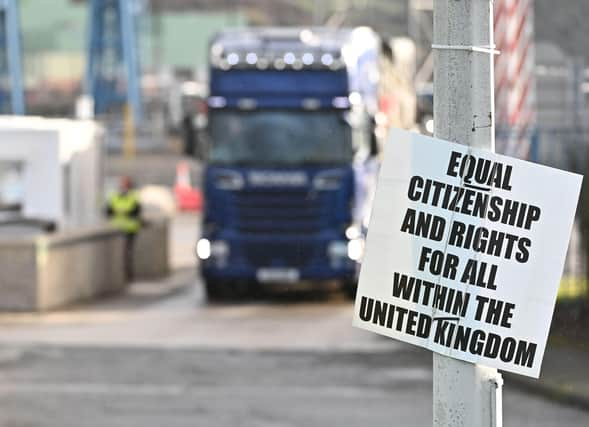Owen Polley: Underwhelming election campaign has not given the Northern Ireland Protocol the focus it needs


The executive collapsed just before the campaign began, street protests against the protocol are ongoing and there remains a real possibility that Sinn Fein could become the largest party at Stormont.
The contest has certainly taken place against a backdrop of unease and instability.
Advertisement
Hide AdAdvertisement
Hide AdThe sea border caused anger and distress that, very occasionally, degenerated into violence and threats. At the same time, unionists’ genuine, reasonable concerns about the protocol are often dismissed with arrogance and even triumphalism by nationalists and pro-EU politicians.


The online sparring on platforms like Twitter, where many political activists spend an unhealthy amount of time, has ranged from tetchy to toxic. But despite all this tension and bad blood, the campaign so far has remained lacklustre.
One possible explanation is that the participants cannot even agree on the terms of the debate, never mind properly addressing the points that their opponents are making.
The unionist parties all believe, with varying degrees of conviction, that the protocol is hugely important at this election. This idea has been dismissed completely by nationalists and Alliance, who claim that most people are unconcerned about the sea border.
Advertisement
Hide AdAdvertisement
Hide AdSimilarly, the DUP says that, if Sinn Fein is allowed to win the election, republicans will deliver a ‘border poll’ and potentially destroy Northern Ireland. For their part, the Shinners can’t seem to decide whether they ‘wake up in the morning’ thinking about an all-Ireland state or not.
Meanwhile, the rest of the parties are playing down the significance of who tops the poll. They point out that the first and deputy first ministers have identical powers and dismiss the notion that there will be a referendum on Northern Ireland’s constitutional position any time soon.
The parties in this election are not engaged in a muscular debate with each other. In fact, it’s often like they’re in different pubs having entirely separate conversations.
When they’re not talking at cross purposes, what they’re saying can turn out to mean very little, if you look at it carefully.
Advertisement
Hide AdAdvertisement
Hide AdFor example, all the parties in this election claim they want to fix the NHS, bring better jobs to Northern Ireland and tackle the ‘cost of living crisis’. While they’re all in agreement about these aims, that’s where the detail becomes murky.
When the parties do suggest actual policies, there’s usually very little explanation of how much they will cost, where the money will come from or what they propose sacrificing to pay for these new initiatives.
Thanks to this lack of meaningful content, we are left with empty platitudes and petty spats about whose election posters have been removed by whom. A number of parties have literally proposed giving people free money, in the form of one-off, non-means tested ‘cost of living’ payments.
A long list of candidates, including some from the UUP, have even supported the idea of trialling a ‘Universal Basic Income’ in Northern Ireland. Again, this essentially means handing everyone a lump sum of cash.
Advertisement
Hide AdAdvertisement
Hide AdThe discussion about the rise in the cost of living is the perfect example of empty words taking precedence over substance. Nationalists and Alliance repeatedly claim that this ‘crisis’ is far more important than the protocol, backing up their argument by referring to various opinion polls.
However, it is transparently dishonest to try to portray the protocol as an issue separate from the cost of living. The price of common products has gone up everywhere, thanks to transport problems, war and inflation, but in Northern Ireland the sea border has made this process worse.
The protocol has pushed up the cost of doing business here for companies in England, Scotland and Wales, where most of our products come from. Some have put their prices up, while others have stopped trading in Northern Ireland altogether. It’s a very basic rule of economics that less choice means things become more expensive.
In Northern Ireland, retail businesses, including supermarkets, were advised directly by the EU to ‘divert’ their supply chains to continental Europe and the Republic. To facilitate this process, Brussels agreed ‘grace periods’ would delay some of the protocol’s worst effects. Every economist knows that diverted supply chains create increased costs for businesses and higher prices for consumers.
Advertisement
Hide AdAdvertisement
Hide AdIn one of the most substantive studies of the protocol, the Fraser of Allander Institute concluded its features would slash our purchasing power by 3.9%. The economist, Esmond Birnie, predicted that ‘£100s of millions’ will be added to yearly shopping bills.
In 2024, the Assembly we elect this week will vote on whether to extend aspects of the protocol and continue to push costs up. It is a shocking indictment that, in this underwhelming election campaign, many of the parties want to divert voters’ attention from this important issue by offering them a one-off payment of £200.